AGL & Origin Energy: Sustainability Report Analysis - ACCT604, 2018
VerifiedAdded on 2023/06/03
|15
|3757
|381
Report
AI Summary
This report provides a comparative analysis of the sustainability reporting practices of AGL Limited and Origin Energy, two prominent Australian companies. It examines their sustainability strategies, objectives, and principles, highlighting the reasons behind their adoption of sustainability approaches. The report evaluates the effectiveness of their reporting, identifies areas of strong and weak sustainability performance, and assesses their utilization of established reporting frameworks like GRI (Global Reporting Initiative) guidelines. Furthermore, it explores external assurance, awards, and other recognition received by these companies, and offers insights into the layout, appearance, readability, and overall length of their sustainability reports. The analysis reveals that both companies align with GRI guidelines to a certain extent but also exhibit areas for improvement in their reporting practices, particularly regarding environmental investment and expenditure, and the inclusion of normalized measures alongside absolute figures for environmental impact.
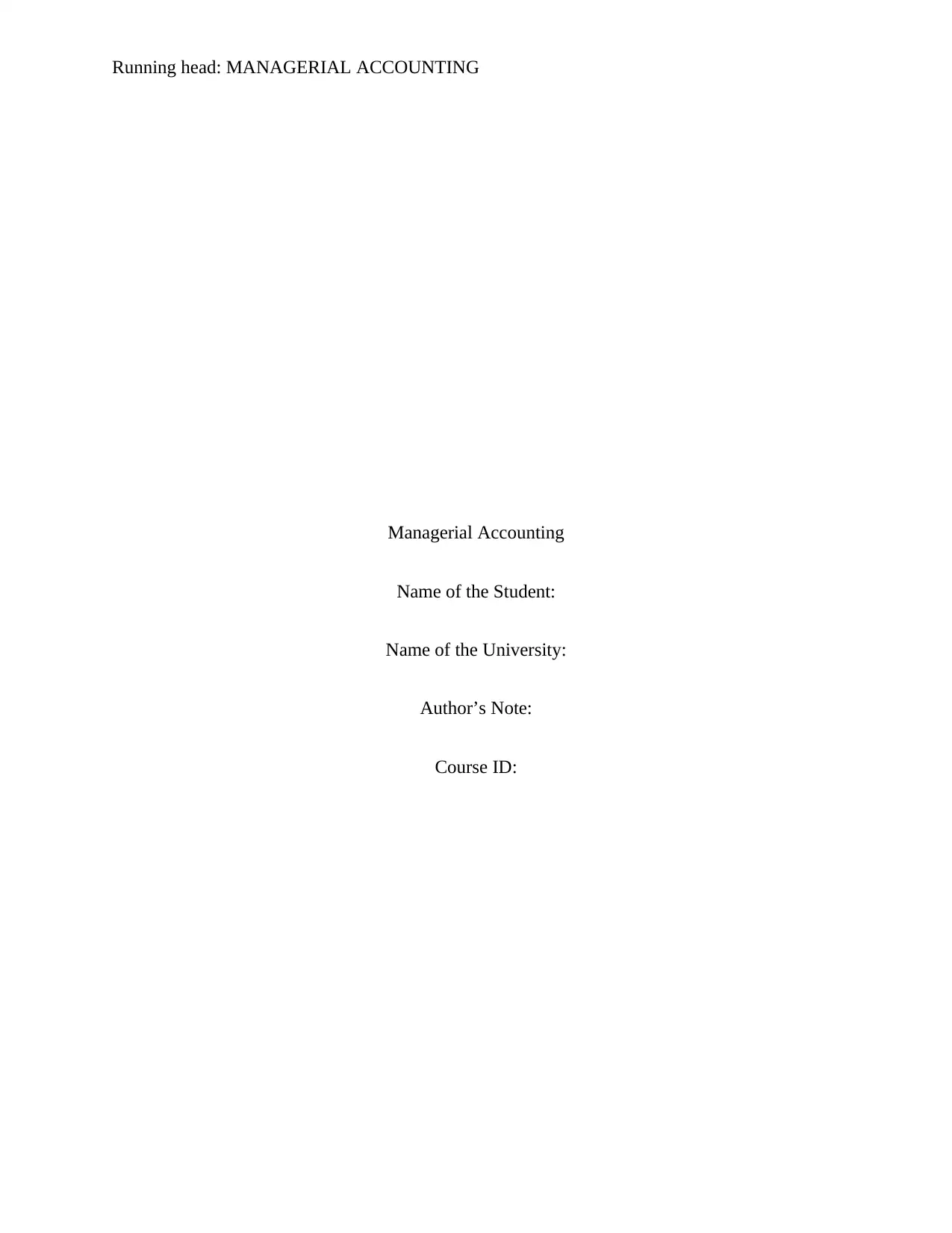
Running head: MANAGERIAL ACCOUNTING
Managerial Accounting
Name of the Student:
Name of the University:
Author’s Note:
Course ID:
Managerial Accounting
Name of the Student:
Name of the University:
Author’s Note:
Course ID:
Paraphrase This Document
Need a fresh take? Get an instant paraphrase of this document with our AI Paraphraser
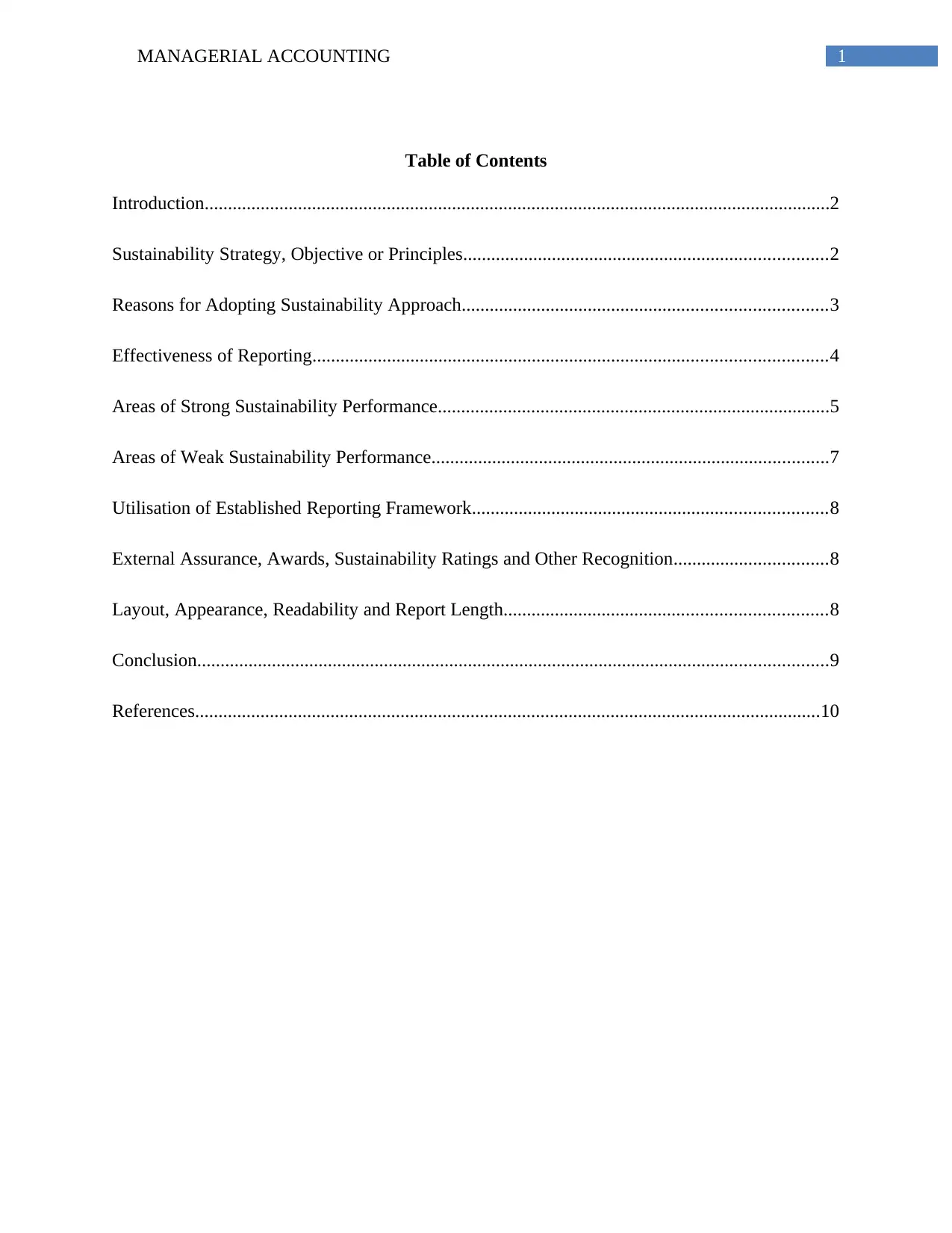
1MANAGERIAL ACCOUNTING
Table of Contents
Introduction......................................................................................................................................2
Sustainability Strategy, Objective or Principles..............................................................................2
Reasons for Adopting Sustainability Approach..............................................................................3
Effectiveness of Reporting..............................................................................................................4
Areas of Strong Sustainability Performance....................................................................................5
Areas of Weak Sustainability Performance.....................................................................................7
Utilisation of Established Reporting Framework............................................................................8
External Assurance, Awards, Sustainability Ratings and Other Recognition.................................8
Layout, Appearance, Readability and Report Length.....................................................................8
Conclusion.......................................................................................................................................9
References......................................................................................................................................10
Table of Contents
Introduction......................................................................................................................................2
Sustainability Strategy, Objective or Principles..............................................................................2
Reasons for Adopting Sustainability Approach..............................................................................3
Effectiveness of Reporting..............................................................................................................4
Areas of Strong Sustainability Performance....................................................................................5
Areas of Weak Sustainability Performance.....................................................................................7
Utilisation of Established Reporting Framework............................................................................8
External Assurance, Awards, Sustainability Ratings and Other Recognition.................................8
Layout, Appearance, Readability and Report Length.....................................................................8
Conclusion.......................................................................................................................................9
References......................................................................................................................................10
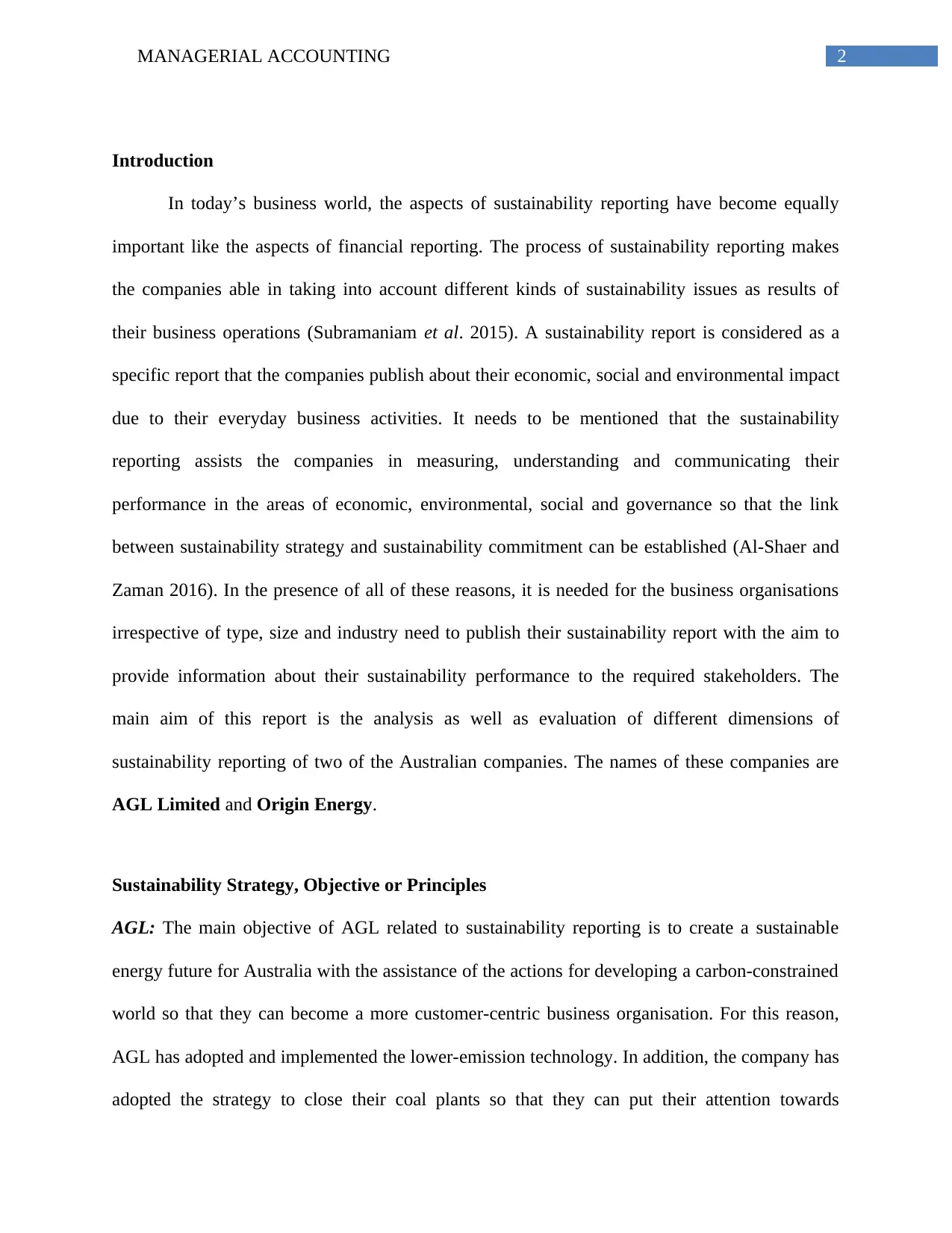
2MANAGERIAL ACCOUNTING
Introduction
In today’s business world, the aspects of sustainability reporting have become equally
important like the aspects of financial reporting. The process of sustainability reporting makes
the companies able in taking into account different kinds of sustainability issues as results of
their business operations (Subramaniam et al. 2015). A sustainability report is considered as a
specific report that the companies publish about their economic, social and environmental impact
due to their everyday business activities. It needs to be mentioned that the sustainability
reporting assists the companies in measuring, understanding and communicating their
performance in the areas of economic, environmental, social and governance so that the link
between sustainability strategy and sustainability commitment can be established (Al-Shaer and
Zaman 2016). In the presence of all of these reasons, it is needed for the business organisations
irrespective of type, size and industry need to publish their sustainability report with the aim to
provide information about their sustainability performance to the required stakeholders. The
main aim of this report is the analysis as well as evaluation of different dimensions of
sustainability reporting of two of the Australian companies. The names of these companies are
AGL Limited and Origin Energy.
Sustainability Strategy, Objective or Principles
AGL: The main objective of AGL related to sustainability reporting is to create a sustainable
energy future for Australia with the assistance of the actions for developing a carbon-constrained
world so that they can become a more customer-centric business organisation. For this reason,
AGL has adopted and implemented the lower-emission technology. In addition, the company has
adopted the strategy to close their coal plants so that they can put their attention towards
Introduction
In today’s business world, the aspects of sustainability reporting have become equally
important like the aspects of financial reporting. The process of sustainability reporting makes
the companies able in taking into account different kinds of sustainability issues as results of
their business operations (Subramaniam et al. 2015). A sustainability report is considered as a
specific report that the companies publish about their economic, social and environmental impact
due to their everyday business activities. It needs to be mentioned that the sustainability
reporting assists the companies in measuring, understanding and communicating their
performance in the areas of economic, environmental, social and governance so that the link
between sustainability strategy and sustainability commitment can be established (Al-Shaer and
Zaman 2016). In the presence of all of these reasons, it is needed for the business organisations
irrespective of type, size and industry need to publish their sustainability report with the aim to
provide information about their sustainability performance to the required stakeholders. The
main aim of this report is the analysis as well as evaluation of different dimensions of
sustainability reporting of two of the Australian companies. The names of these companies are
AGL Limited and Origin Energy.
Sustainability Strategy, Objective or Principles
AGL: The main objective of AGL related to sustainability reporting is to create a sustainable
energy future for Australia with the assistance of the actions for developing a carbon-constrained
world so that they can become a more customer-centric business organisation. For this reason,
AGL has adopted and implemented the lower-emission technology. In addition, the company has
adopted the strategy to close their coal plants so that they can put their attention towards
⊘ This is a preview!⊘
Do you want full access?
Subscribe today to unlock all pages.

Trusted by 1+ million students worldwide
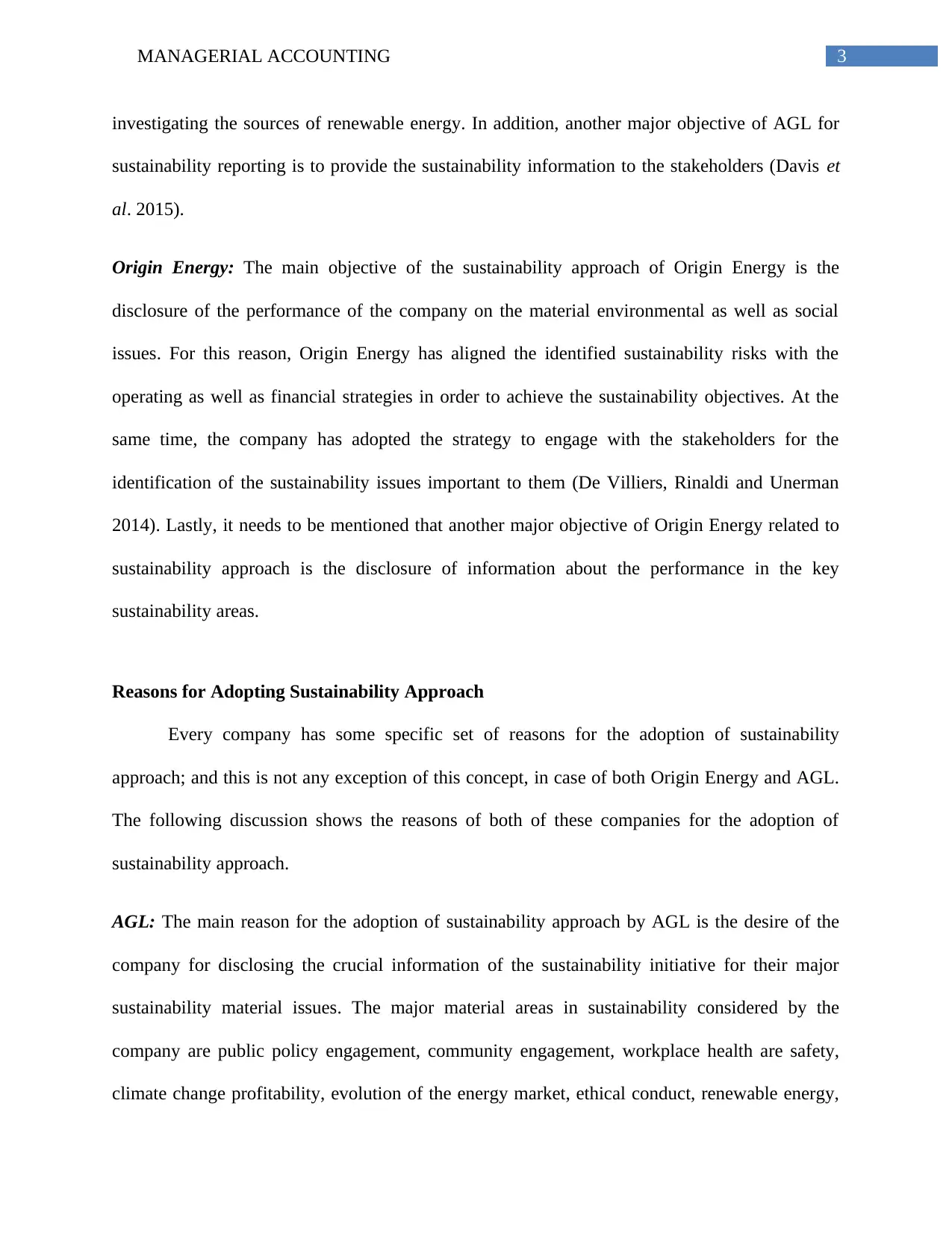
3MANAGERIAL ACCOUNTING
investigating the sources of renewable energy. In addition, another major objective of AGL for
sustainability reporting is to provide the sustainability information to the stakeholders (Davis et
al. 2015).
Origin Energy: The main objective of the sustainability approach of Origin Energy is the
disclosure of the performance of the company on the material environmental as well as social
issues. For this reason, Origin Energy has aligned the identified sustainability risks with the
operating as well as financial strategies in order to achieve the sustainability objectives. At the
same time, the company has adopted the strategy to engage with the stakeholders for the
identification of the sustainability issues important to them (De Villiers, Rinaldi and Unerman
2014). Lastly, it needs to be mentioned that another major objective of Origin Energy related to
sustainability approach is the disclosure of information about the performance in the key
sustainability areas.
Reasons for Adopting Sustainability Approach
Every company has some specific set of reasons for the adoption of sustainability
approach; and this is not any exception of this concept, in case of both Origin Energy and AGL.
The following discussion shows the reasons of both of these companies for the adoption of
sustainability approach.
AGL: The main reason for the adoption of sustainability approach by AGL is the desire of the
company for disclosing the crucial information of the sustainability initiative for their major
sustainability material issues. The major material areas in sustainability considered by the
company are public policy engagement, community engagement, workplace health are safety,
climate change profitability, evolution of the energy market, ethical conduct, renewable energy,
investigating the sources of renewable energy. In addition, another major objective of AGL for
sustainability reporting is to provide the sustainability information to the stakeholders (Davis et
al. 2015).
Origin Energy: The main objective of the sustainability approach of Origin Energy is the
disclosure of the performance of the company on the material environmental as well as social
issues. For this reason, Origin Energy has aligned the identified sustainability risks with the
operating as well as financial strategies in order to achieve the sustainability objectives. At the
same time, the company has adopted the strategy to engage with the stakeholders for the
identification of the sustainability issues important to them (De Villiers, Rinaldi and Unerman
2014). Lastly, it needs to be mentioned that another major objective of Origin Energy related to
sustainability approach is the disclosure of information about the performance in the key
sustainability areas.
Reasons for Adopting Sustainability Approach
Every company has some specific set of reasons for the adoption of sustainability
approach; and this is not any exception of this concept, in case of both Origin Energy and AGL.
The following discussion shows the reasons of both of these companies for the adoption of
sustainability approach.
AGL: The main reason for the adoption of sustainability approach by AGL is the desire of the
company for disclosing the crucial information of the sustainability initiative for their major
sustainability material issues. The major material areas in sustainability considered by the
company are public policy engagement, community engagement, workplace health are safety,
climate change profitability, evolution of the energy market, ethical conduct, renewable energy,
Paraphrase This Document
Need a fresh take? Get an instant paraphrase of this document with our AI Paraphraser

4MANAGERIAL ACCOUNTING
distribution of the energy services along with the energy efficiency and others (Del Mar Alonso‐
Almeida, Llach and Marimon 2014).
Origin Energy: In case of Origin Energy, the main reason behind the adoption of sustainability
approach by the company is the disclosure of the information about the performance of the
company on the material issue of the sustainability. At the same time, the company has the
intention to disclose the material information about sustainability performance to the
stakeholders. Some of the material issues of Origin Energy can be seen in the areas of climate
change, carbon emission, people and culture, process safety, water, waste, access to the land and
coexistence, communities, supply chain, customers and the common people of the society
(Depoers, Jeanjean and Jérôme 2016).
Thus, it can be seen from the above discussion that both AGL and Origin Energy has
almost the same reason for the adoption of the strategy of sustainability approach.
Effectiveness of Reporting
AGL: Origin Energy has addressed the key sustainability issues of the key stakeholders by
effectively engaged with them. The key issues for the people of the company are workplace
safety, career development opportunity, training, remuneration and recognition; and the company
has engaged with them by conducting survey ever two year to get feedback from them on these
issues. The key sustainability issues of the investment community are the response of AGL to the
social, environmental and governance risks and the company engages with these stakeholders
through surveys, meetings, face-to-face interactions and conferences. The issues associated with
the government of the organisation are energy infrastructure development, energy prices,
renewable energy and climate change policies. AGL is involved in regular communication with
distribution of the energy services along with the energy efficiency and others (Del Mar Alonso‐
Almeida, Llach and Marimon 2014).
Origin Energy: In case of Origin Energy, the main reason behind the adoption of sustainability
approach by the company is the disclosure of the information about the performance of the
company on the material issue of the sustainability. At the same time, the company has the
intention to disclose the material information about sustainability performance to the
stakeholders. Some of the material issues of Origin Energy can be seen in the areas of climate
change, carbon emission, people and culture, process safety, water, waste, access to the land and
coexistence, communities, supply chain, customers and the common people of the society
(Depoers, Jeanjean and Jérôme 2016).
Thus, it can be seen from the above discussion that both AGL and Origin Energy has
almost the same reason for the adoption of the strategy of sustainability approach.
Effectiveness of Reporting
AGL: Origin Energy has addressed the key sustainability issues of the key stakeholders by
effectively engaged with them. The key issues for the people of the company are workplace
safety, career development opportunity, training, remuneration and recognition; and the company
has engaged with them by conducting survey ever two year to get feedback from them on these
issues. The key sustainability issues of the investment community are the response of AGL to the
social, environmental and governance risks and the company engages with these stakeholders
through surveys, meetings, face-to-face interactions and conferences. The issues associated with
the government of the organisation are energy infrastructure development, energy prices,
renewable energy and climate change policies. AGL is involved in regular communication with
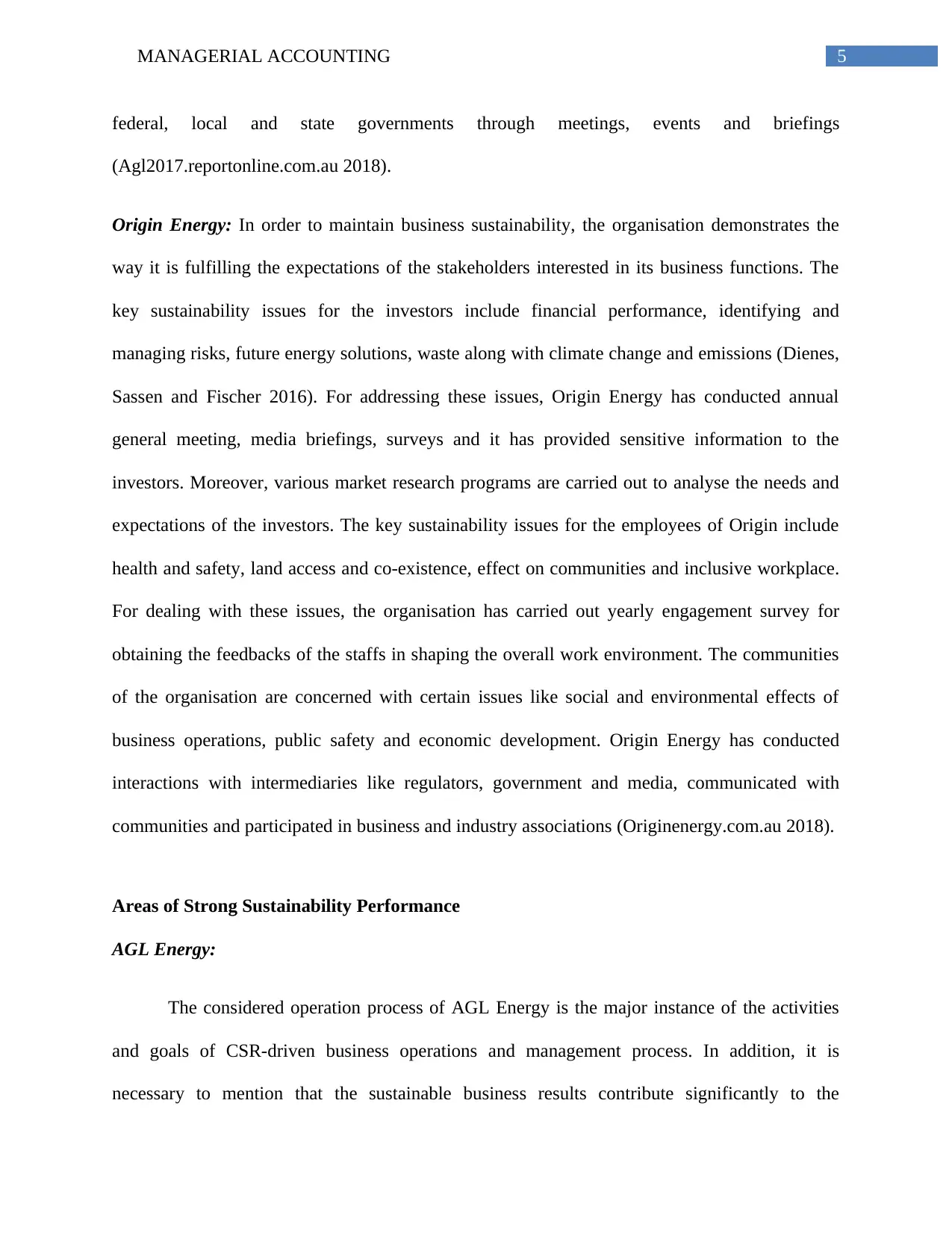
5MANAGERIAL ACCOUNTING
federal, local and state governments through meetings, events and briefings
(Agl2017.reportonline.com.au 2018).
Origin Energy: In order to maintain business sustainability, the organisation demonstrates the
way it is fulfilling the expectations of the stakeholders interested in its business functions. The
key sustainability issues for the investors include financial performance, identifying and
managing risks, future energy solutions, waste along with climate change and emissions (Dienes,
Sassen and Fischer 2016). For addressing these issues, Origin Energy has conducted annual
general meeting, media briefings, surveys and it has provided sensitive information to the
investors. Moreover, various market research programs are carried out to analyse the needs and
expectations of the investors. The key sustainability issues for the employees of Origin include
health and safety, land access and co-existence, effect on communities and inclusive workplace.
For dealing with these issues, the organisation has carried out yearly engagement survey for
obtaining the feedbacks of the staffs in shaping the overall work environment. The communities
of the organisation are concerned with certain issues like social and environmental effects of
business operations, public safety and economic development. Origin Energy has conducted
interactions with intermediaries like regulators, government and media, communicated with
communities and participated in business and industry associations (Originenergy.com.au 2018).
Areas of Strong Sustainability Performance
AGL Energy:
The considered operation process of AGL Energy is the major instance of the activities
and goals of CSR-driven business operations and management process. In addition, it is
necessary to mention that the sustainable business results contribute significantly to the
federal, local and state governments through meetings, events and briefings
(Agl2017.reportonline.com.au 2018).
Origin Energy: In order to maintain business sustainability, the organisation demonstrates the
way it is fulfilling the expectations of the stakeholders interested in its business functions. The
key sustainability issues for the investors include financial performance, identifying and
managing risks, future energy solutions, waste along with climate change and emissions (Dienes,
Sassen and Fischer 2016). For addressing these issues, Origin Energy has conducted annual
general meeting, media briefings, surveys and it has provided sensitive information to the
investors. Moreover, various market research programs are carried out to analyse the needs and
expectations of the investors. The key sustainability issues for the employees of Origin include
health and safety, land access and co-existence, effect on communities and inclusive workplace.
For dealing with these issues, the organisation has carried out yearly engagement survey for
obtaining the feedbacks of the staffs in shaping the overall work environment. The communities
of the organisation are concerned with certain issues like social and environmental effects of
business operations, public safety and economic development. Origin Energy has conducted
interactions with intermediaries like regulators, government and media, communicated with
communities and participated in business and industry associations (Originenergy.com.au 2018).
Areas of Strong Sustainability Performance
AGL Energy:
The considered operation process of AGL Energy is the major instance of the activities
and goals of CSR-driven business operations and management process. In addition, it is
necessary to mention that the sustainable business results contribute significantly to the
⊘ This is a preview!⊘
Do you want full access?
Subscribe today to unlock all pages.

Trusted by 1+ million students worldwide
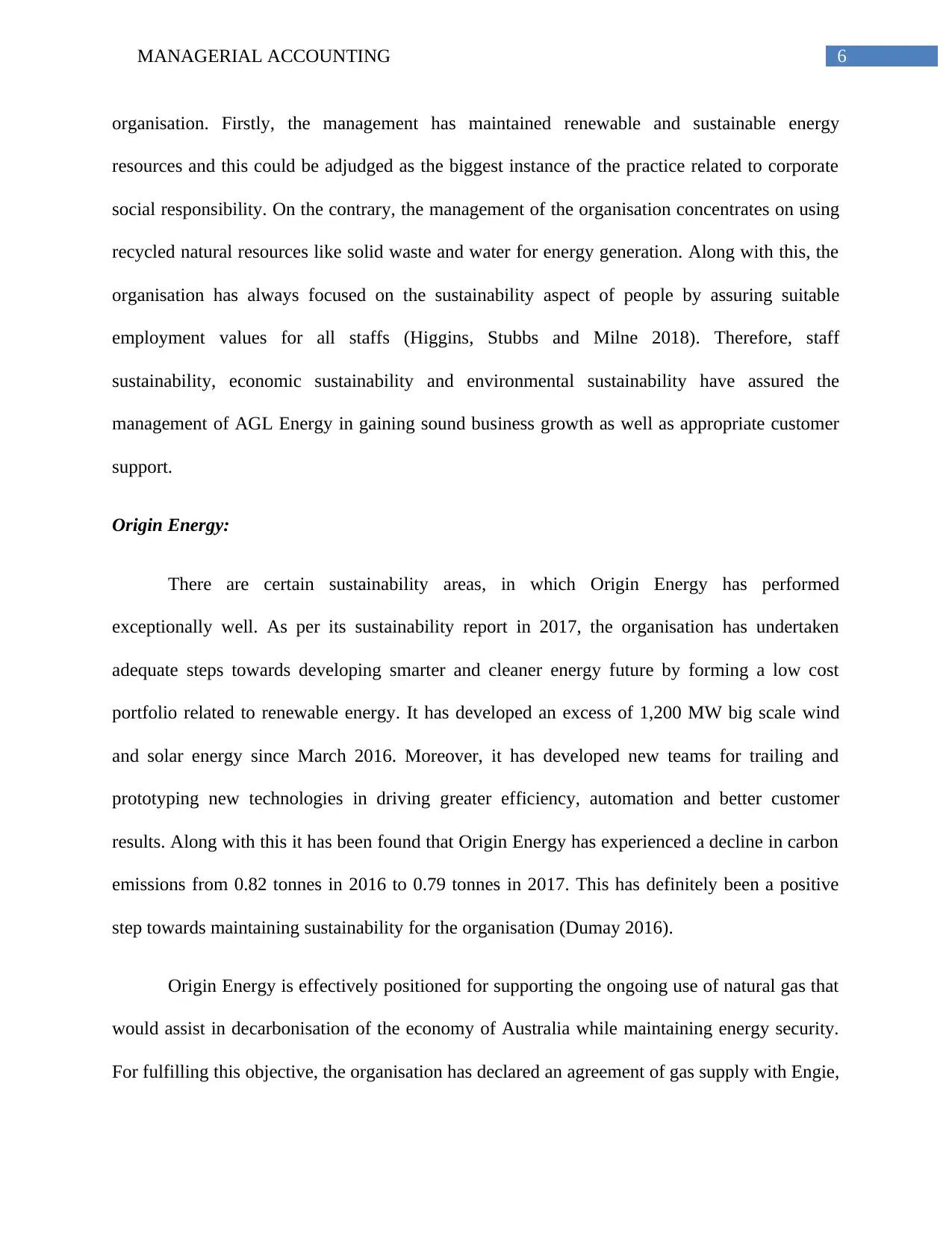
6MANAGERIAL ACCOUNTING
organisation. Firstly, the management has maintained renewable and sustainable energy
resources and this could be adjudged as the biggest instance of the practice related to corporate
social responsibility. On the contrary, the management of the organisation concentrates on using
recycled natural resources like solid waste and water for energy generation. Along with this, the
organisation has always focused on the sustainability aspect of people by assuring suitable
employment values for all staffs (Higgins, Stubbs and Milne 2018). Therefore, staff
sustainability, economic sustainability and environmental sustainability have assured the
management of AGL Energy in gaining sound business growth as well as appropriate customer
support.
Origin Energy:
There are certain sustainability areas, in which Origin Energy has performed
exceptionally well. As per its sustainability report in 2017, the organisation has undertaken
adequate steps towards developing smarter and cleaner energy future by forming a low cost
portfolio related to renewable energy. It has developed an excess of 1,200 MW big scale wind
and solar energy since March 2016. Moreover, it has developed new teams for trailing and
prototyping new technologies in driving greater efficiency, automation and better customer
results. Along with this it has been found that Origin Energy has experienced a decline in carbon
emissions from 0.82 tonnes in 2016 to 0.79 tonnes in 2017. This has definitely been a positive
step towards maintaining sustainability for the organisation (Dumay 2016).
Origin Energy is effectively positioned for supporting the ongoing use of natural gas that
would assist in decarbonisation of the economy of Australia while maintaining energy security.
For fulfilling this objective, the organisation has declared an agreement of gas supply with Engie,
organisation. Firstly, the management has maintained renewable and sustainable energy
resources and this could be adjudged as the biggest instance of the practice related to corporate
social responsibility. On the contrary, the management of the organisation concentrates on using
recycled natural resources like solid waste and water for energy generation. Along with this, the
organisation has always focused on the sustainability aspect of people by assuring suitable
employment values for all staffs (Higgins, Stubbs and Milne 2018). Therefore, staff
sustainability, economic sustainability and environmental sustainability have assured the
management of AGL Energy in gaining sound business growth as well as appropriate customer
support.
Origin Energy:
There are certain sustainability areas, in which Origin Energy has performed
exceptionally well. As per its sustainability report in 2017, the organisation has undertaken
adequate steps towards developing smarter and cleaner energy future by forming a low cost
portfolio related to renewable energy. It has developed an excess of 1,200 MW big scale wind
and solar energy since March 2016. Moreover, it has developed new teams for trailing and
prototyping new technologies in driving greater efficiency, automation and better customer
results. Along with this it has been found that Origin Energy has experienced a decline in carbon
emissions from 0.82 tonnes in 2016 to 0.79 tonnes in 2017. This has definitely been a positive
step towards maintaining sustainability for the organisation (Dumay 2016).
Origin Energy is effectively positioned for supporting the ongoing use of natural gas that
would assist in decarbonisation of the economy of Australia while maintaining energy security.
For fulfilling this objective, the organisation has declared an agreement of gas supply with Engie,
Paraphrase This Document
Need a fresh take? Get an instant paraphrase of this document with our AI Paraphraser
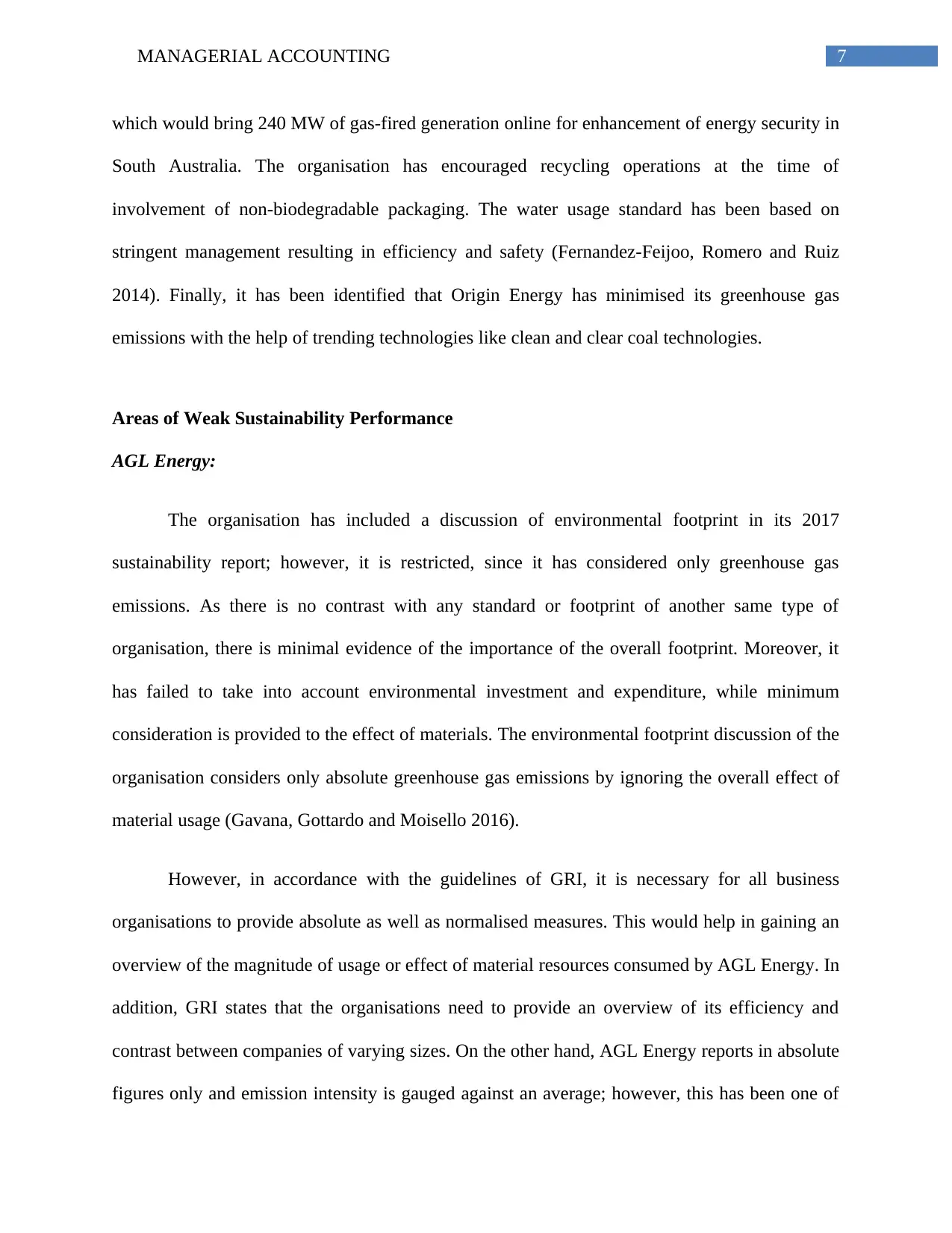
7MANAGERIAL ACCOUNTING
which would bring 240 MW of gas-fired generation online for enhancement of energy security in
South Australia. The organisation has encouraged recycling operations at the time of
involvement of non-biodegradable packaging. The water usage standard has been based on
stringent management resulting in efficiency and safety (Fernandez-Feijoo, Romero and Ruiz
2014). Finally, it has been identified that Origin Energy has minimised its greenhouse gas
emissions with the help of trending technologies like clean and clear coal technologies.
Areas of Weak Sustainability Performance
AGL Energy:
The organisation has included a discussion of environmental footprint in its 2017
sustainability report; however, it is restricted, since it has considered only greenhouse gas
emissions. As there is no contrast with any standard or footprint of another same type of
organisation, there is minimal evidence of the importance of the overall footprint. Moreover, it
has failed to take into account environmental investment and expenditure, while minimum
consideration is provided to the effect of materials. The environmental footprint discussion of the
organisation considers only absolute greenhouse gas emissions by ignoring the overall effect of
material usage (Gavana, Gottardo and Moisello 2016).
However, in accordance with the guidelines of GRI, it is necessary for all business
organisations to provide absolute as well as normalised measures. This would help in gaining an
overview of the magnitude of usage or effect of material resources consumed by AGL Energy. In
addition, GRI states that the organisations need to provide an overview of its efficiency and
contrast between companies of varying sizes. On the other hand, AGL Energy reports in absolute
figures only and emission intensity is gauged against an average; however, this has been one of
which would bring 240 MW of gas-fired generation online for enhancement of energy security in
South Australia. The organisation has encouraged recycling operations at the time of
involvement of non-biodegradable packaging. The water usage standard has been based on
stringent management resulting in efficiency and safety (Fernandez-Feijoo, Romero and Ruiz
2014). Finally, it has been identified that Origin Energy has minimised its greenhouse gas
emissions with the help of trending technologies like clean and clear coal technologies.
Areas of Weak Sustainability Performance
AGL Energy:
The organisation has included a discussion of environmental footprint in its 2017
sustainability report; however, it is restricted, since it has considered only greenhouse gas
emissions. As there is no contrast with any standard or footprint of another same type of
organisation, there is minimal evidence of the importance of the overall footprint. Moreover, it
has failed to take into account environmental investment and expenditure, while minimum
consideration is provided to the effect of materials. The environmental footprint discussion of the
organisation considers only absolute greenhouse gas emissions by ignoring the overall effect of
material usage (Gavana, Gottardo and Moisello 2016).
However, in accordance with the guidelines of GRI, it is necessary for all business
organisations to provide absolute as well as normalised measures. This would help in gaining an
overview of the magnitude of usage or effect of material resources consumed by AGL Energy. In
addition, GRI states that the organisations need to provide an overview of its efficiency and
contrast between companies of varying sizes. On the other hand, AGL Energy reports in absolute
figures only and emission intensity is gauged against an average; however, this has been one of
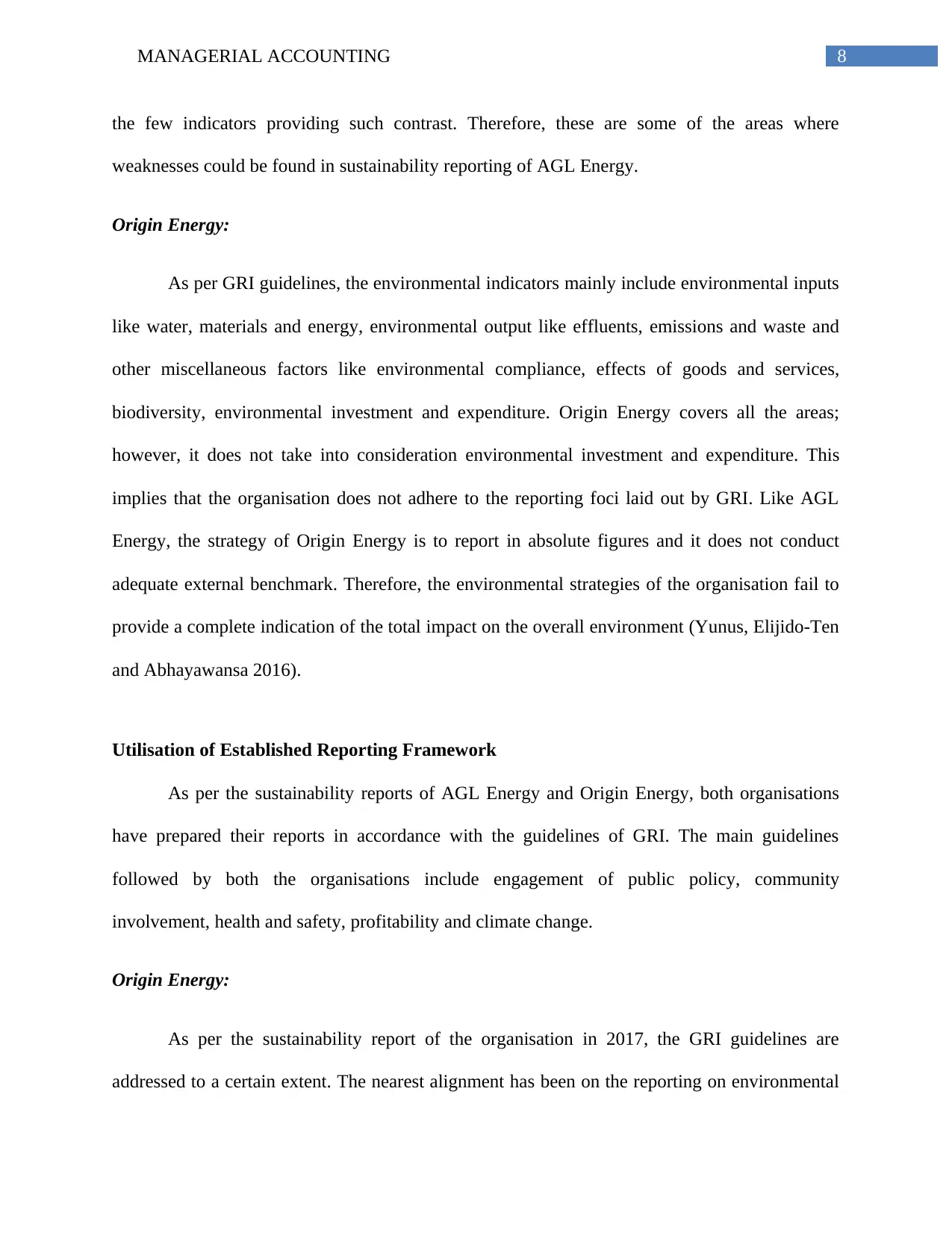
8MANAGERIAL ACCOUNTING
the few indicators providing such contrast. Therefore, these are some of the areas where
weaknesses could be found in sustainability reporting of AGL Energy.
Origin Energy:
As per GRI guidelines, the environmental indicators mainly include environmental inputs
like water, materials and energy, environmental output like effluents, emissions and waste and
other miscellaneous factors like environmental compliance, effects of goods and services,
biodiversity, environmental investment and expenditure. Origin Energy covers all the areas;
however, it does not take into consideration environmental investment and expenditure. This
implies that the organisation does not adhere to the reporting foci laid out by GRI. Like AGL
Energy, the strategy of Origin Energy is to report in absolute figures and it does not conduct
adequate external benchmark. Therefore, the environmental strategies of the organisation fail to
provide a complete indication of the total impact on the overall environment (Yunus, Elijido-Ten
and Abhayawansa 2016).
Utilisation of Established Reporting Framework
As per the sustainability reports of AGL Energy and Origin Energy, both organisations
have prepared their reports in accordance with the guidelines of GRI. The main guidelines
followed by both the organisations include engagement of public policy, community
involvement, health and safety, profitability and climate change.
Origin Energy:
As per the sustainability report of the organisation in 2017, the GRI guidelines are
addressed to a certain extent. The nearest alignment has been on the reporting on environmental
the few indicators providing such contrast. Therefore, these are some of the areas where
weaknesses could be found in sustainability reporting of AGL Energy.
Origin Energy:
As per GRI guidelines, the environmental indicators mainly include environmental inputs
like water, materials and energy, environmental output like effluents, emissions and waste and
other miscellaneous factors like environmental compliance, effects of goods and services,
biodiversity, environmental investment and expenditure. Origin Energy covers all the areas;
however, it does not take into consideration environmental investment and expenditure. This
implies that the organisation does not adhere to the reporting foci laid out by GRI. Like AGL
Energy, the strategy of Origin Energy is to report in absolute figures and it does not conduct
adequate external benchmark. Therefore, the environmental strategies of the organisation fail to
provide a complete indication of the total impact on the overall environment (Yunus, Elijido-Ten
and Abhayawansa 2016).
Utilisation of Established Reporting Framework
As per the sustainability reports of AGL Energy and Origin Energy, both organisations
have prepared their reports in accordance with the guidelines of GRI. The main guidelines
followed by both the organisations include engagement of public policy, community
involvement, health and safety, profitability and climate change.
Origin Energy:
As per the sustainability report of the organisation in 2017, the GRI guidelines are
addressed to a certain extent. The nearest alignment has been on the reporting on environmental
⊘ This is a preview!⊘
Do you want full access?
Subscribe today to unlock all pages.

Trusted by 1+ million students worldwide
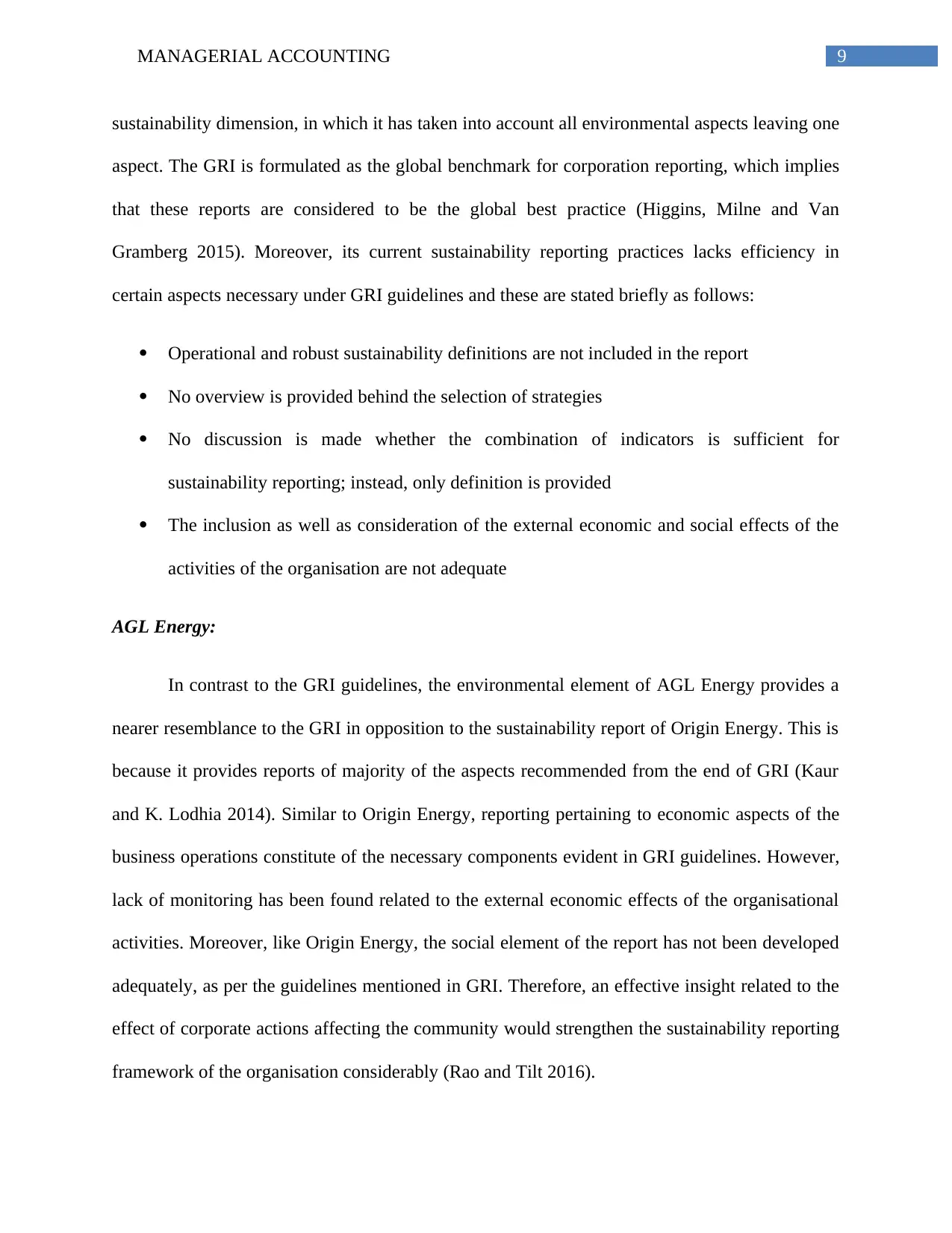
9MANAGERIAL ACCOUNTING
sustainability dimension, in which it has taken into account all environmental aspects leaving one
aspect. The GRI is formulated as the global benchmark for corporation reporting, which implies
that these reports are considered to be the global best practice (Higgins, Milne and Van
Gramberg 2015). Moreover, its current sustainability reporting practices lacks efficiency in
certain aspects necessary under GRI guidelines and these are stated briefly as follows:
Operational and robust sustainability definitions are not included in the report
No overview is provided behind the selection of strategies
No discussion is made whether the combination of indicators is sufficient for
sustainability reporting; instead, only definition is provided
The inclusion as well as consideration of the external economic and social effects of the
activities of the organisation are not adequate
AGL Energy:
In contrast to the GRI guidelines, the environmental element of AGL Energy provides a
nearer resemblance to the GRI in opposition to the sustainability report of Origin Energy. This is
because it provides reports of majority of the aspects recommended from the end of GRI (Kaur
and K. Lodhia 2014). Similar to Origin Energy, reporting pertaining to economic aspects of the
business operations constitute of the necessary components evident in GRI guidelines. However,
lack of monitoring has been found related to the external economic effects of the organisational
activities. Moreover, like Origin Energy, the social element of the report has not been developed
adequately, as per the guidelines mentioned in GRI. Therefore, an effective insight related to the
effect of corporate actions affecting the community would strengthen the sustainability reporting
framework of the organisation considerably (Rao and Tilt 2016).
sustainability dimension, in which it has taken into account all environmental aspects leaving one
aspect. The GRI is formulated as the global benchmark for corporation reporting, which implies
that these reports are considered to be the global best practice (Higgins, Milne and Van
Gramberg 2015). Moreover, its current sustainability reporting practices lacks efficiency in
certain aspects necessary under GRI guidelines and these are stated briefly as follows:
Operational and robust sustainability definitions are not included in the report
No overview is provided behind the selection of strategies
No discussion is made whether the combination of indicators is sufficient for
sustainability reporting; instead, only definition is provided
The inclusion as well as consideration of the external economic and social effects of the
activities of the organisation are not adequate
AGL Energy:
In contrast to the GRI guidelines, the environmental element of AGL Energy provides a
nearer resemblance to the GRI in opposition to the sustainability report of Origin Energy. This is
because it provides reports of majority of the aspects recommended from the end of GRI (Kaur
and K. Lodhia 2014). Similar to Origin Energy, reporting pertaining to economic aspects of the
business operations constitute of the necessary components evident in GRI guidelines. However,
lack of monitoring has been found related to the external economic effects of the organisational
activities. Moreover, like Origin Energy, the social element of the report has not been developed
adequately, as per the guidelines mentioned in GRI. Therefore, an effective insight related to the
effect of corporate actions affecting the community would strengthen the sustainability reporting
framework of the organisation considerably (Rao and Tilt 2016).
Paraphrase This Document
Need a fresh take? Get an instant paraphrase of this document with our AI Paraphraser
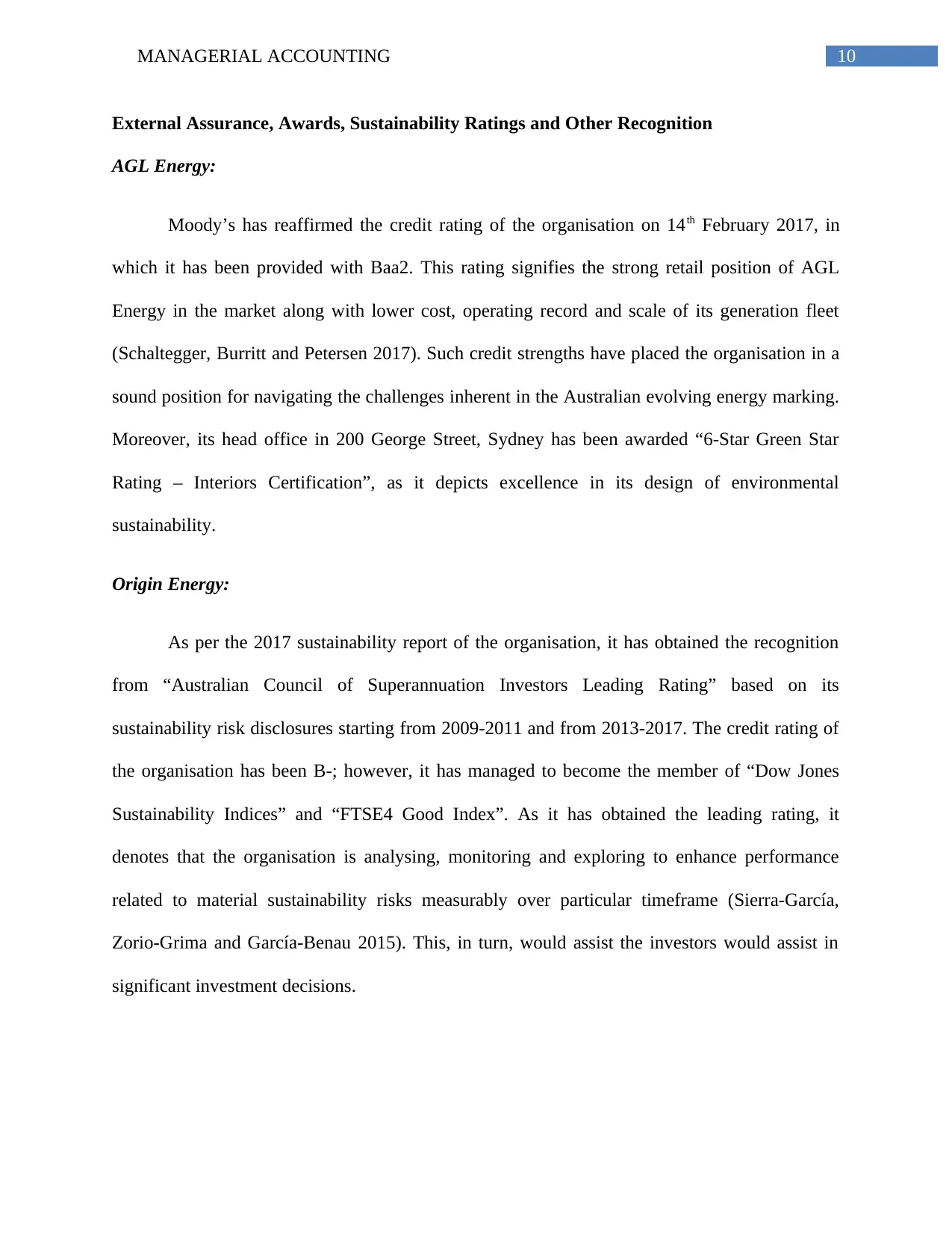
10MANAGERIAL ACCOUNTING
External Assurance, Awards, Sustainability Ratings and Other Recognition
AGL Energy:
Moody’s has reaffirmed the credit rating of the organisation on 14th February 2017, in
which it has been provided with Baa2. This rating signifies the strong retail position of AGL
Energy in the market along with lower cost, operating record and scale of its generation fleet
(Schaltegger, Burritt and Petersen 2017). Such credit strengths have placed the organisation in a
sound position for navigating the challenges inherent in the Australian evolving energy marking.
Moreover, its head office in 200 George Street, Sydney has been awarded “6-Star Green Star
Rating – Interiors Certification”, as it depicts excellence in its design of environmental
sustainability.
Origin Energy:
As per the 2017 sustainability report of the organisation, it has obtained the recognition
from “Australian Council of Superannuation Investors Leading Rating” based on its
sustainability risk disclosures starting from 2009-2011 and from 2013-2017. The credit rating of
the organisation has been B-; however, it has managed to become the member of “Dow Jones
Sustainability Indices” and “FTSE4 Good Index”. As it has obtained the leading rating, it
denotes that the organisation is analysing, monitoring and exploring to enhance performance
related to material sustainability risks measurably over particular timeframe (Sierra‐García,
Zorio‐Grima and García‐Benau 2015). This, in turn, would assist the investors would assist in
significant investment decisions.
External Assurance, Awards, Sustainability Ratings and Other Recognition
AGL Energy:
Moody’s has reaffirmed the credit rating of the organisation on 14th February 2017, in
which it has been provided with Baa2. This rating signifies the strong retail position of AGL
Energy in the market along with lower cost, operating record and scale of its generation fleet
(Schaltegger, Burritt and Petersen 2017). Such credit strengths have placed the organisation in a
sound position for navigating the challenges inherent in the Australian evolving energy marking.
Moreover, its head office in 200 George Street, Sydney has been awarded “6-Star Green Star
Rating – Interiors Certification”, as it depicts excellence in its design of environmental
sustainability.
Origin Energy:
As per the 2017 sustainability report of the organisation, it has obtained the recognition
from “Australian Council of Superannuation Investors Leading Rating” based on its
sustainability risk disclosures starting from 2009-2011 and from 2013-2017. The credit rating of
the organisation has been B-; however, it has managed to become the member of “Dow Jones
Sustainability Indices” and “FTSE4 Good Index”. As it has obtained the leading rating, it
denotes that the organisation is analysing, monitoring and exploring to enhance performance
related to material sustainability risks measurably over particular timeframe (Sierra‐García,
Zorio‐Grima and García‐Benau 2015). This, in turn, would assist the investors would assist in
significant investment decisions.
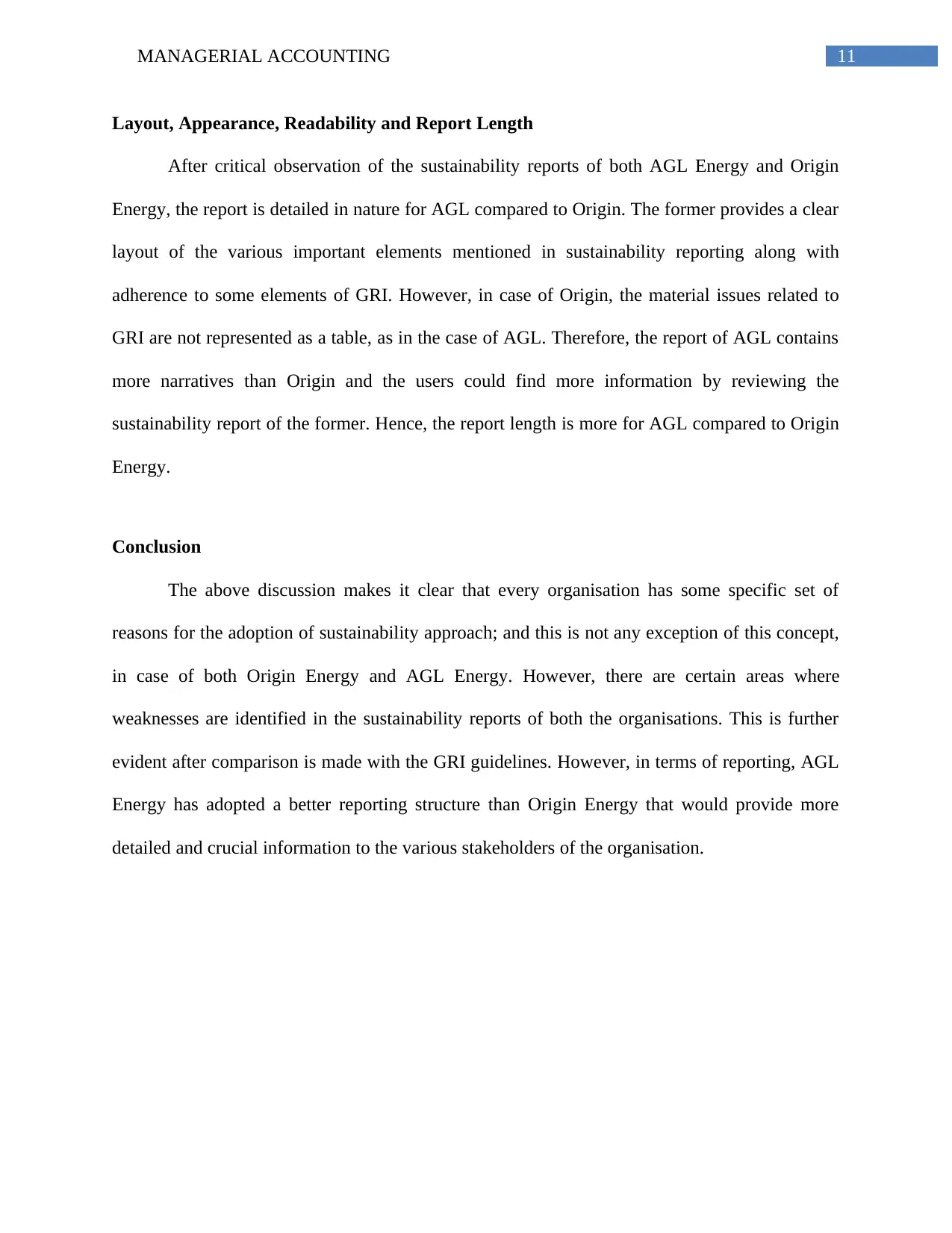
11MANAGERIAL ACCOUNTING
Layout, Appearance, Readability and Report Length
After critical observation of the sustainability reports of both AGL Energy and Origin
Energy, the report is detailed in nature for AGL compared to Origin. The former provides a clear
layout of the various important elements mentioned in sustainability reporting along with
adherence to some elements of GRI. However, in case of Origin, the material issues related to
GRI are not represented as a table, as in the case of AGL. Therefore, the report of AGL contains
more narratives than Origin and the users could find more information by reviewing the
sustainability report of the former. Hence, the report length is more for AGL compared to Origin
Energy.
Conclusion
The above discussion makes it clear that every organisation has some specific set of
reasons for the adoption of sustainability approach; and this is not any exception of this concept,
in case of both Origin Energy and AGL Energy. However, there are certain areas where
weaknesses are identified in the sustainability reports of both the organisations. This is further
evident after comparison is made with the GRI guidelines. However, in terms of reporting, AGL
Energy has adopted a better reporting structure than Origin Energy that would provide more
detailed and crucial information to the various stakeholders of the organisation.
Layout, Appearance, Readability and Report Length
After critical observation of the sustainability reports of both AGL Energy and Origin
Energy, the report is detailed in nature for AGL compared to Origin. The former provides a clear
layout of the various important elements mentioned in sustainability reporting along with
adherence to some elements of GRI. However, in case of Origin, the material issues related to
GRI are not represented as a table, as in the case of AGL. Therefore, the report of AGL contains
more narratives than Origin and the users could find more information by reviewing the
sustainability report of the former. Hence, the report length is more for AGL compared to Origin
Energy.
Conclusion
The above discussion makes it clear that every organisation has some specific set of
reasons for the adoption of sustainability approach; and this is not any exception of this concept,
in case of both Origin Energy and AGL Energy. However, there are certain areas where
weaknesses are identified in the sustainability reports of both the organisations. This is further
evident after comparison is made with the GRI guidelines. However, in terms of reporting, AGL
Energy has adopted a better reporting structure than Origin Energy that would provide more
detailed and crucial information to the various stakeholders of the organisation.
⊘ This is a preview!⊘
Do you want full access?
Subscribe today to unlock all pages.

Trusted by 1+ million students worldwide
1 out of 15
Related Documents
Your All-in-One AI-Powered Toolkit for Academic Success.
+13062052269
info@desklib.com
Available 24*7 on WhatsApp / Email
![[object Object]](/_next/static/media/star-bottom.7253800d.svg)
Unlock your academic potential
Copyright © 2020–2025 A2Z Services. All Rights Reserved. Developed and managed by ZUCOL.





